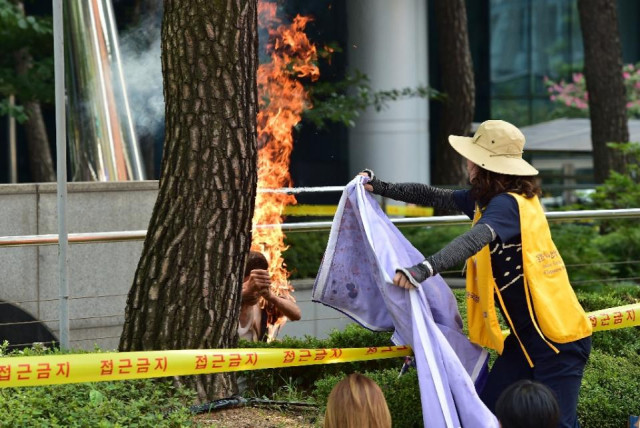Man sets self on fire outside Japanese embassy in Seoul
Self-immolation is not that rare in South Korea and was particularly common during the pro-democracy movement of the 1980s

A man sets himself on fire as a South Korean woman tries to extinguish the flames outside the Japanese embassy in Seoul. PHOTO: AFP
Television news footage showed other protestors using a blanket and bottled water to try and douse the flames before the emergency services arrived.
Firefighters eventually removed the man by stretcher to an ambulance which rushed him to hospital.
Read: One killed, 12 injured as fire erupts in Lahore plaza
His precise condition was not known, but local news reports suggested his injuries were not life-threatening.
The Yonhap news agency identified him as an 81-year-old, surnamed Choi, from the southern city of Gwangju.
Self-immolation is not that rare in South Korea and was particularly common during the pro-democracy movement of the 1980s and early-90s, when a number of student activists set themselves on fire during public demonstrations.
Such acts are not limited to political protest. In May this year, a 56-year-old disabled man died after setting himself on fire in a dispute with his landlord, and a 29-year-old killed himself the same way in March after his girlfriend rejected a marriage proposal.
The last such self-immolation outside the Japanese embassy was in 2005, when a 54-year-old man set himself on fore during a protest over Japan's claim to a set of South Korean-controlled islets in the East Sea (Sea of Japan).
Read: Ablaze: Towel factory gutted in fire
 PHOTO: AFP
PHOTO: AFPWednesday's protest had drawn close to 1,000 protestors to the embassy ahead of Saturday's 70th anniversary of the end of Japan's 1910-45 colonial rule over the Korean peninsula.
South Korea says Japan has still not done enough to atone for the forced recruitment of South Korean women to work in Japanese military brothels as so-called "comfort women".
Japan insists the issue was settled in the 1965 bilateral agreement that restored diplomatic ties between the two nations, which saw Tokyo make a total payment of $800 million in grants or loans to its former colony.
The issue has strained relations between Seoul and Tokyo for years with South Korean President Park Geun-Hye saying there can be no meeting with Japanese Prime Minister Shinzo Abe until Japan makes full amends.



















COMMENTS
Comments are moderated and generally will be posted if they are on-topic and not abusive.
For more information, please see our Comments FAQ